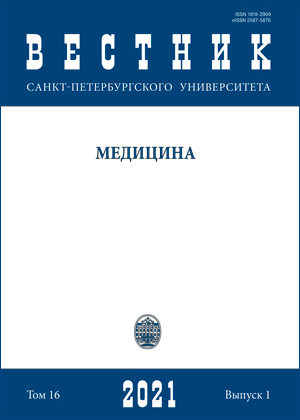Postoperative cognitive dysfunction in patients of the elderly and old age operated for composition of objective cancer
DOI:
https://doi.org/10.21638/spbu11.2021.104Abstract
The problem of preserving the quality of life in the postoperative period, one of the criteria of which is the cognitive function, retains its relevance. In patients with advanced and senile age, after undergoing surgery, cognitive disorders are swept aside, which, according to various authors, reaches 64 %. Postoperative cognitive dysfunction was studied in 168 elderly and elderly patients operated on for complications of colon cancer. Patients were divided into two groups. Patients of the control group were operated on operations conventionally, the main one — laparoscopically, using endovideosurgical technologies. Cognitive status was assessed before the operation, as well as on the first, third and seventh days of the postoperative period
using the MMSE test (abbr. English Mini Mental State Examination). The incidence of postoperative cognitive dysfunction in both groups was traced. In the development of postoperative cognitive disorders, along with such factors as general anesthesia, age, aggravated neurological history, depressive disorders, operative trauma plays an important role. The use of endoscopic technologies allows reliably reducing the risk of postoperative cognitive impairment, which in turn has a beneficial effect on the postoperative period.
Keywords:
colon cancer, cognitive dysfunction, surgical treatment, postoperative period, elderly and old age
Downloads
References
References
Downloads
Published
How to Cite
Issue
Section
License
Articles of "Vestnik of Saint Petersburg University. Medicine" are open access distributed under the terms of the License Agreement with Saint Petersburg State University, which permits to the authors unrestricted distribution and self-archiving free of charge.




